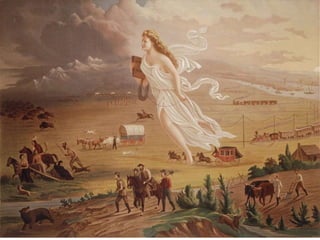
Empire and Expansion
- 2. Closing the American Frontier The frontier," he claimed, "is the line of most rapid Americanization." The presence and predominance of numerous cultural traits -- "that coarseness and strength combined with acuteness and acquisitiveness; that practical inventive turn of mind, quick to find expedients; that masterful grasp of material things... that restless, nervous energy; that dominant individualism"
- 8. Who were the major world powers in the late 19th century?
- 9. Imperialism - control by one country of the political, economic, or cultural life of another country or region Motives 1. Commercial/business interests - new markets and raw materials 2. Military/strategic interests - Security/dominance in the Western Hemisphere 3. Belief in cultural superiority/missionary zeal - Social Darwinist thinking; religious/missionary interests; “civilizing mission” America becomes an Empire
- 10. 1. Commercial/Business Interests U. S. Foreign Investments: 1869-1908
- 12. 2. Military/Strategic Interests Alfred T. Mahan The Influence of Sea Power on History: 1660-1783
- 14. U. S. Interventions in Latin America: 1898-1920s
- 15. 3. Belief in Cultural Superiority The White Man’s Burden The Hierarchy of Race
- 18. Hawaii: "Crossroads of the Pacific" Imiola Church – first built in the late 1820s
- 19. How did the U.S. view Hawaiians? Hawaii becomes a U. S. Protectorate in 1849 by virtue of economic treaties.
- 20. Queen Liliuokalani Hawaii was reduced to 17% of its original native population because of disease. American sugar planters imported Chinese and Japanese laborers in such large numbers that Hawaiians became outnumbered! Hawaii for the Hawaiians!
- 22. What events expedited the annexation of Hawaii in 1898? What is the justification used for annexation?
- 23. To The Victor Belongs the Spoils Hawaiian Annexation Ceremony, 1898 Statehood - 19
- 24. Why was the US interested in Cuban affairs?
- 29. “ Yellow Journalism” & Jingoism Joseph Pulitzer Hearst to Frederick Remington: “ You furnish the pictures, and I’ll furnish the war!” William Randolph Hearst The “yellow kid”
- 32. “ Remember the Maine and to Hell with Spain!” Funeral for Maine victims in Havana
- 33. “ The warship Maine was split in two by an enemy’s secret infernal machine.” ~ The Journal Hearst’s paper offered a $50,000 reward! ($1,167,963 today)
- 35. The Spanish-American War (1898): “That Splendid Little War”
- 37. Dewey Captures Manila! “ The very devil seemed to possess him!” Is He To Be a Despot?
- 38. The “Rough Riders”
- 40. Emilio Aguinaldo
- 44. William H. Taft, 1st Gov.-General of the Philippines
- 45. Our “Sphere of Influence”
- 49. A picture of a “water detail,” reportedly taken in May, 1901, in Sual, the Philippines. “It is a terrible torture,” one soldier wrote.
- 55. China
- 56. Stereotypes of the Chinese Immigrant Oriental [Chinese] Exclusion Act, 1887
- 57. Inroads to China
- 60. The Open Door Policy
- 62. “ Mr. Bryan in 1899—‘I stand just where I stood three years ago!’” undated William Jennings Bryan Campaigning for the Presidency, 1896 William Jennings Bryan is shown staring through the White House fence contemplating a second run for President. On October 20, 1899, Bryan announced that during his 1896 campaign he stood for free silver at a ratio of 16-1 and asserted that “I stand today where I stood then.” This cartoon plays on those words: Bryan, who had lost the 1896 election, is standing in the same place—outside the gates of the White House looking in. Berryman’s cartoon proved prophetic—Bryan lost the Presidential election in 1900. U.S. Senate Collection Center for Legislative Archives Williams Jennings Bryan: the Perpetual Candidate
- 63. Imperialism or “Bryanism”? Bryan’s campaign emphasized the injustice of American imperialism McKinley’s campaign focused on prosperity and expansion of “civilization”
- 64. Election of 1900 * NM, OK, AZ – territories Political Party Presidential Nom. VP Nom. # % # % Republican William McKinley Theodore Roosevelt 292 65.3 7,219,193 51.7 Democratic William Jennings Bryan Adlai E. Stevenson 155 34.7 6,357,698 45.5
- 65. Panama
- 67. Panama Canal TR in Panama (Construction begins in 1904)
- 68. The Roosevelt Corollary to the Monroe Doctrine: 1905 Chronic wrongdoing… may in America, as elsewhere, ultimately require intervention by some civilized nation, and in the Western Hemisphere the adherence of the United States to the Monroe Doctrine may force the United States, however reluctantly, in flagrant cases of such wrongdoing or impotence, to the exercise of an international police power .
- 70. Speak Softly, But Carry a Big Stick! Did Roosevelt more often “speak softly” or use the “big stick”? Was his approach to foreign policy aggressive or simply energetic?
- 71. Japan
- 76. The Great White Fleet: 1907
- 78. America as a Pacific Power
- 80. The Cares of a Growing Family
- 81. Constable of the World
- 83. Mexico
- 85. The Mexican Revolution: 1910s Emiliano Zapata Francisco I Madero Venustiano Carranza Porfirio Diaz Pancho Villa
- 87. Searching for Banditos General John J. Pershing with Pancho Villa in 1914.
- 88. U. S. Global Investments & Investments in Latin America, 1914
- 89. Uncle Sam: One of the “Boys?”
- 92. Alaska
- 93. “ Seward’s Folly”: 1867 $7.2 million
- 94. “ Seward’s Icebox”: 1867